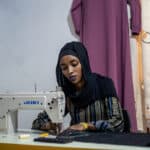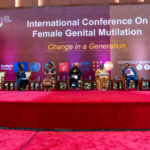
I am Coumba Guindo, the president of the Consultative Committee of the Women of Koussanar and a woman leader in Koussanar. My community has practised FGM/C for generations, and I used to assist the excisers in identifying girls who would undergo this practice. However, everything changed when I witnessed my own sister undergo excision and the devastating consequences it had on her health. This experience deeply impacted me, and I became passionately committed to protecting vulnerable girls.
Initial Awareness-Raising Activities
I embarked on raising awareness within my family to abandon this practice, but it was not easy. Female genital mutilation was seen as a source of income, and convincing my family required strong arguments about the health effects my sister was experiencing. Eventually, I succeeded in persuading them.I didn’t stop there. I travelled to neighbouring villages on a cart, covering long distances to raise awareness among communities that were not aware of the dangers of female genital mutilation. I would start my day early, arriving in neighbouring communities before daybreak, just to sensitize them about the negative consequences of FGM/C.
Through their consortium partner ActionAid Senegal, The Girl Generation trained and supported me in my endeavours. We formed an association called Women’s Circle, which gathered women, young girls, boys, community leaders, and religious leaders to raise their voices against female genital mutilation. With the support of religious leaders, I was able to educate communities that FGM/C is not a requirement in the Quran and provides no health benefits.
In our efforts to raise awareness, we employed a range of methods, including conducting home visits, organizing caravans, hosting radio programs, and holding weekly gatherings with women in my community to address the issue of violence against women and girls. The Women’s Circle Association played a pivotal role by providing a platform for girls at risk to openly express their concerns about gender-based violence, all while offering them vital psychological support. We also dedicated ourselves to educating them about the health repercussions of female genital mutilation, including conditions like fistula and infertility.
The Girl Generation programme seeks to accelerate positive changes in social attitudes toward ending FGM/C, within a broader vision of a world where girls and women can exercise their power and rights, have expanded choice and agency, and be free from all forms of violence. This vision encompasses not only the eradication of FGM/C but also the amplification of survivors’ voices, the empowerment of communities, and the safeguarding of the rights and dignity of all girls.
Achievements
In addition to legal actions, our community adopted social penalties to discourage the practice of FGM. When we became aware that a girl had undergone excision, we exerted social pressure by abstaining from participating in significant social gatherings such as baptisms, weddings, and funerals involving families linked to FGM. These sanctions demonstrated their effectiveness in dissuading families from subjecting their daughters to this harmful practice.
With the valuable backing of ActionAid Senegal under The Girl Generation programme, the Women’s Circle and I have made substantial strides toward eradicating female genital mutilation in our community.
While we commemorate our achievements locally, it’s important to note that female genital mutilation has not been eliminated. We continue to confront the challenge of cross-border FGM, and our aim remains to bring it to an end.


